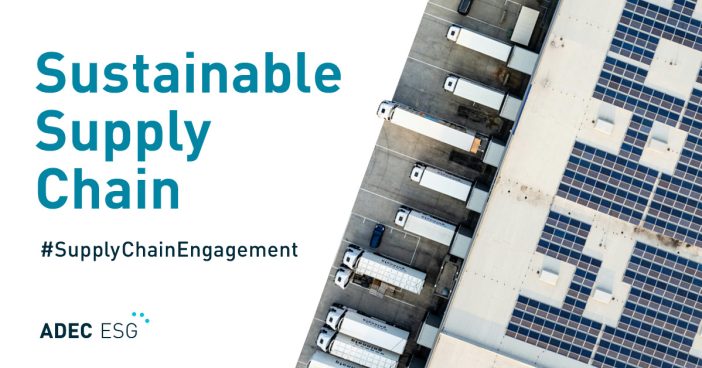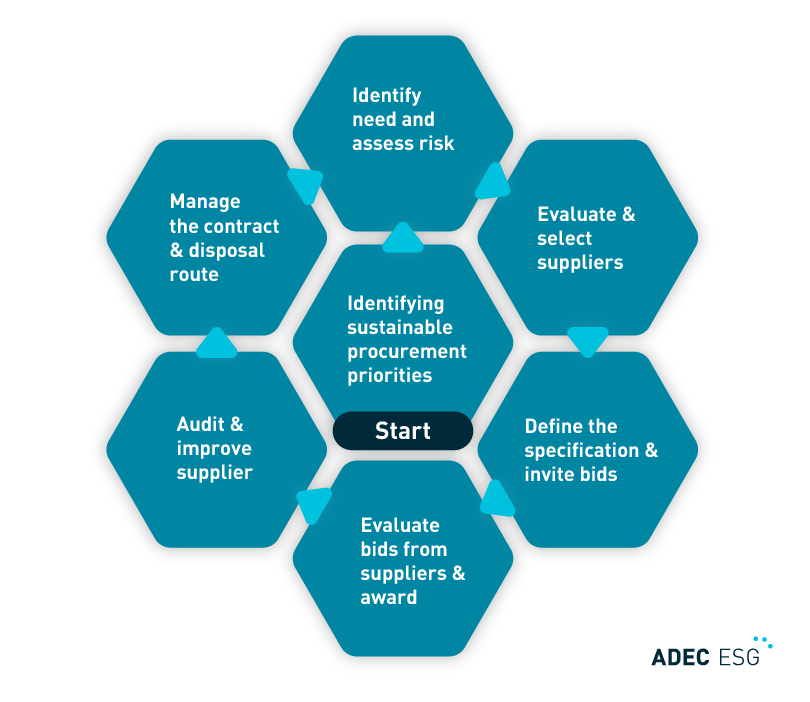A business that is truly a responsible steward to the environment, whether they are a multinational organization or a single proprietorship, will look beyond their walls to lower their impacts. Only recently have large to small scale businesses begun considering carbon footprints as a criterion in selecting their suppliers. This shows how important it is to seek out the best practices and to adopt and adapt as the times demand. The level of your supplier’s sustainability has a bearing on how sustainable your business is.
Start from Within
Prioritize which of your organization’s sustainable objectives and goals are relevant when choosing the right supplier for the job.
As depicted in the process flow shown in Figure 1, this is the first step towards finding the right sustainable supplier. This flowchart is part of the materials developed by Sustainable Procurement Limited for the United Nations Marrakech Taskforce for Sustainable Procurement, and is currently being used by New Zealand’s Ministry of Economic Development – Government Procurement Development Group.
Simply put, if your suppliers are aligned with where your company is going, then this alignment can make getting there easier.
What Should Suppliers Submit?
Due to the amount of data your organization has to go through when suppliers submit their credentials and supporting documents, a pre-qualification questionnaire (PQQ) can be answered by interested suppliers to effectively screen those that have the potential to meet your requirements from those that are not eligible.
The PQQ ensures that the suppliers who make it through this step are aligned with your organization’s sustainability objectives and goals.
Some of the items your PPQ should include are:
- Environmental Management practices – Ask if they use a certified environmental management system (EMS).
- Compliance with Environmental Legislation – Research if the supplier has been prosecuted for breaking the law (environmental or otherwise) in the past.
- Their product’s Life Cycle Assessment / Environmental Impact – Inquire about each product’s environmental footprint (carbon, energy, water, and waste) to determine what happens when their products are produced, used, and disposed.
- Procurement practices – Look to see if a supplier is working to identify possible environmental and/or social risks from its supply chain.
- Social Responsibility policies and practices – Are your suppliers compliant with local, national, and international labor laws related to their employees’ health, safety, and welfare.
Challenge your Suppliers
Once the right suppliers have been found, your organization will start to reap the benefits. For example your “value for money” proposition will have more weight or substance with your clients, you will get better sustainability metrics by which to manage your overall sustainability, and you will likely reduce costs.
However, supply chain sustainability does not stop there. Complacency is your enemy in supplier management. To avoid it, you must challenge not only your own organization but also your suppliers. Again, your suppliers are part of the bigger picture. Suppliers (new or old) must do their share and continue to meet or better yet, exceed the standards you have set for them during the selection process.
For example, your organization can set specific supplier targets or identify key performance indicators (KPIs) to measure or quantify how much existing suppliers have improved compared to when their contract started. Incentives for top performers could include being part of a preferred list that enjoys the privilege of being the first to bid for a new project; or of being selected to work on developing an improved product or service.
ADEC ESG Solutions helps organizations around the world foster more sustainable supply chains and achieve ambitious emissions reduction goals. Contact us to learn more about how our fully integrated, custom solutions can help your organization on its Sustainability Journey.





